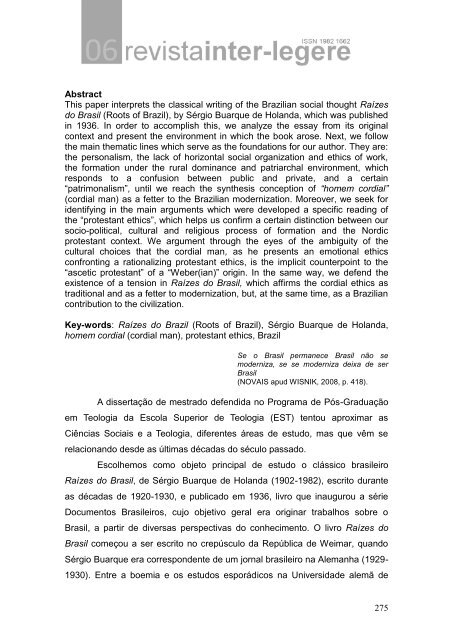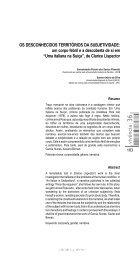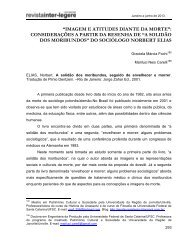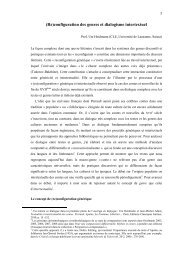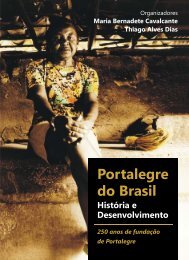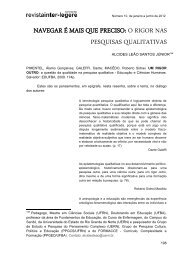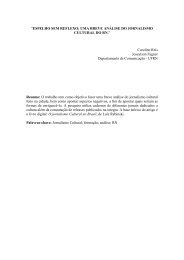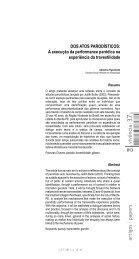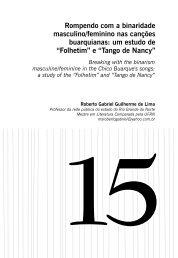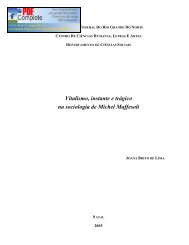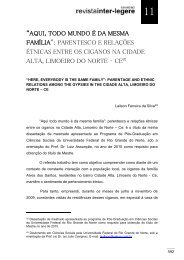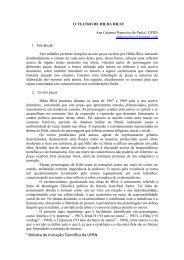Seção Dissertações e Teses - CCHLA/UFRN
Seção Dissertações e Teses - CCHLA/UFRN
Seção Dissertações e Teses - CCHLA/UFRN
Create successful ePaper yourself
Turn your PDF publications into a flip-book with our unique Google optimized e-Paper software.
Abstract<br />
This paper interprets the classical writing of the Brazilian social thought Raízes<br />
do Brasil (Roots of Brazil), by Sérgio Buarque de Holanda, which was published<br />
in 1936. In order to accomplish this, we analyze the essay from its original<br />
context and present the environment in which the book arose. Next, we follow<br />
the main thematic lines which serve as the foundations for our author. They are:<br />
the personalism, the lack of horizontal social organization and ethics of work,<br />
the formation under the rural dominance and patriarchal environment, which<br />
responds to a confusion between public and private, and a certain<br />
“patrimonalism”, until we reach the synthesis conception of “homem cordial”<br />
(cordial man) as a fetter to the Brazilian modernization. Moreover, we seek for<br />
identifying in the main arguments which were developed a specific reading of<br />
the “protestant ethics”, which helps us confirm a certain distinction between our<br />
socio-political, cultural and religious process of formation and the Nordic<br />
protestant context. We argument through the eyes of the ambiguity of the<br />
cultural choices that the cordial man, as he presents an emotional ethics<br />
confronting a rationalizing protestant ethics, is the implicit counterpoint to the<br />
“ascetic protestant” of a “Weber(ian)” origin. In the same way, we defend the<br />
existence of a tension in Raízes do Brasil, which affirms the cordial ethics as<br />
traditional and as a fetter to modernization, but, at the same time, as a Brazilian<br />
contribution to the civilization.<br />
Key-words: Raízes do Brazil (Roots of Brazil), Sérgio Buarque de Holanda,<br />
homem cordial (cordial man), protestant ethics, Brazil<br />
Se o Brasil permanece Brasil não se<br />
moderniza, se se moderniza deixa de ser<br />
Brasil<br />
(NOVAIS apud WISNIK, 2008, p. 418).<br />
A dissertação de mestrado defendida no Programa de Pós-Graduação<br />
em Teologia da Escola Superior de Teologia (EST) tentou aproximar as<br />
Ciências Sociais e a Teologia, diferentes áreas de estudo, mas que vêm se<br />
relacionando desde as últimas décadas do século passado.<br />
Escolhemos como objeto principal de estudo o clássico brasileiro<br />
Raízes do Brasil, de Sérgio Buarque de Holanda (1902-1982), escrito durante<br />
as décadas de 1920-1930, e publicado em 1936, livro que inaugurou a série<br />
Documentos Brasileiros, cujo objetivo geral era originar trabalhos sobre o<br />
Brasil, a partir de diversas perspectivas do conhecimento. O livro Raízes do<br />
Brasil começou a ser escrito no crepúsculo da República de Weimar, quando<br />
Sérgio Buarque era correspondente de um jornal brasileiro na Alemanha (1929-<br />
1930). Entre a boemia e os estudos esporádicos na Universidade alemã de<br />
275


